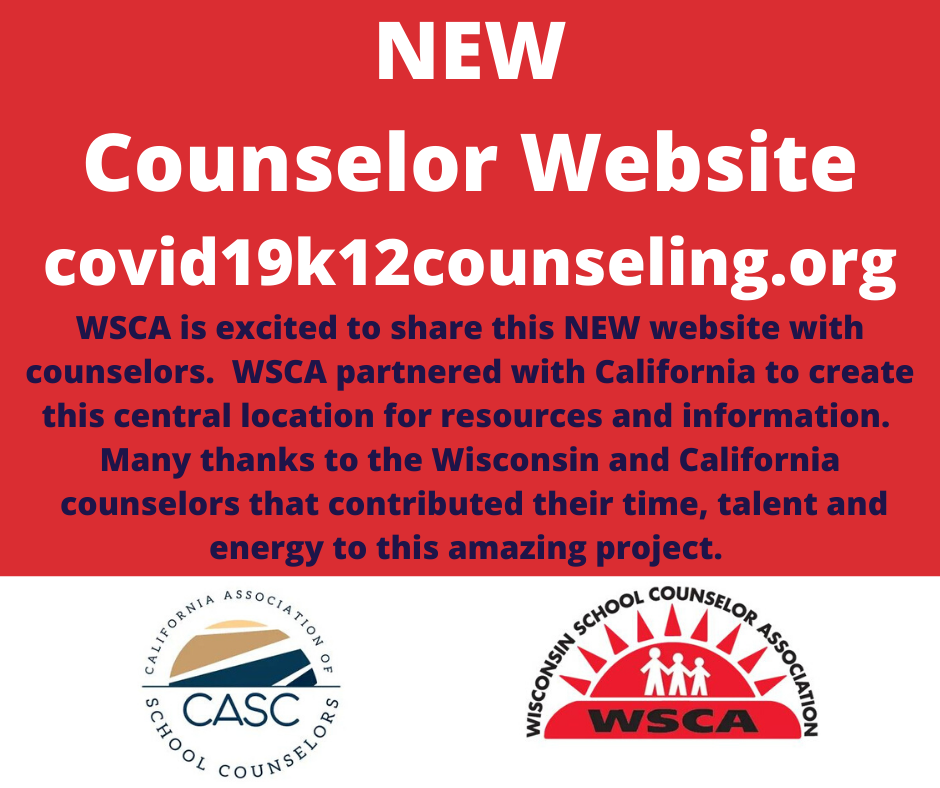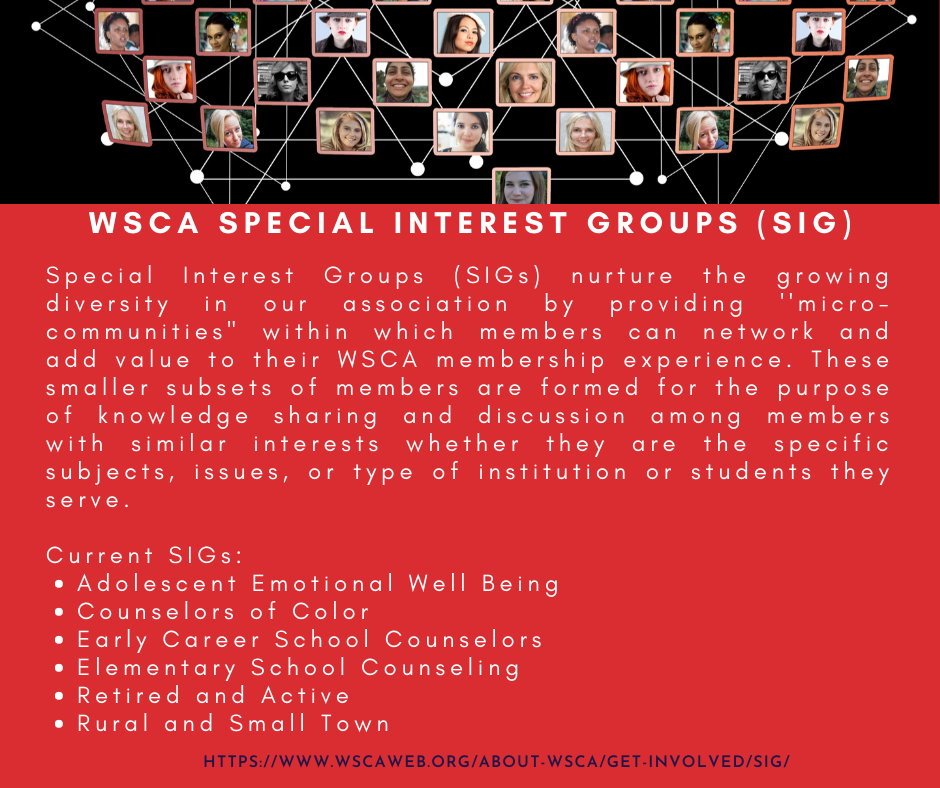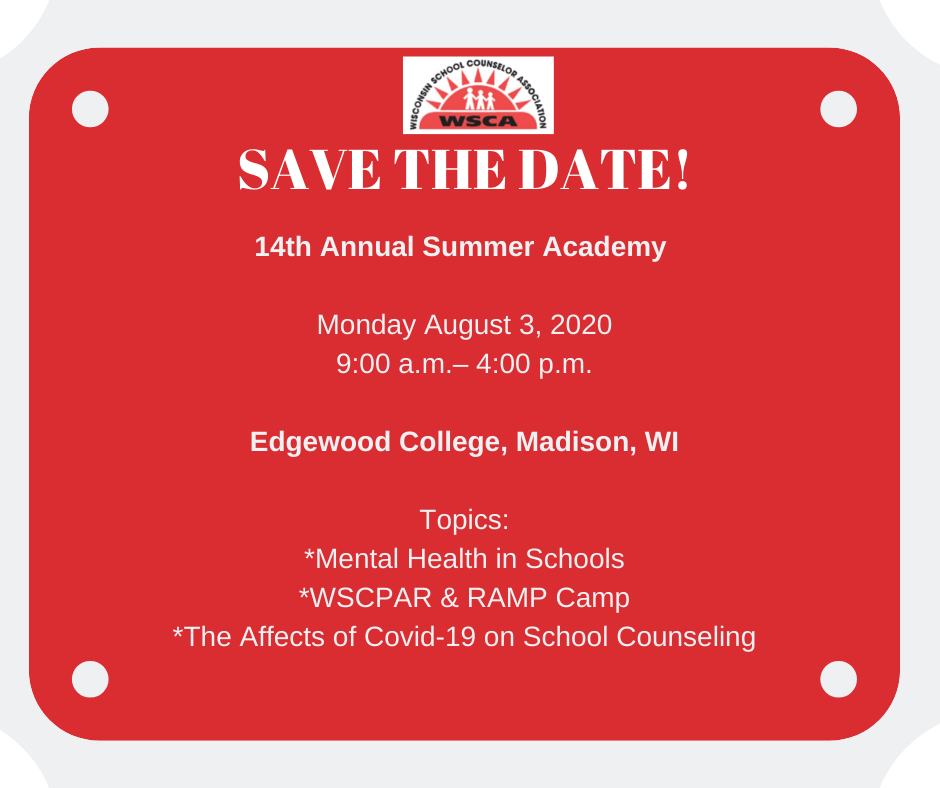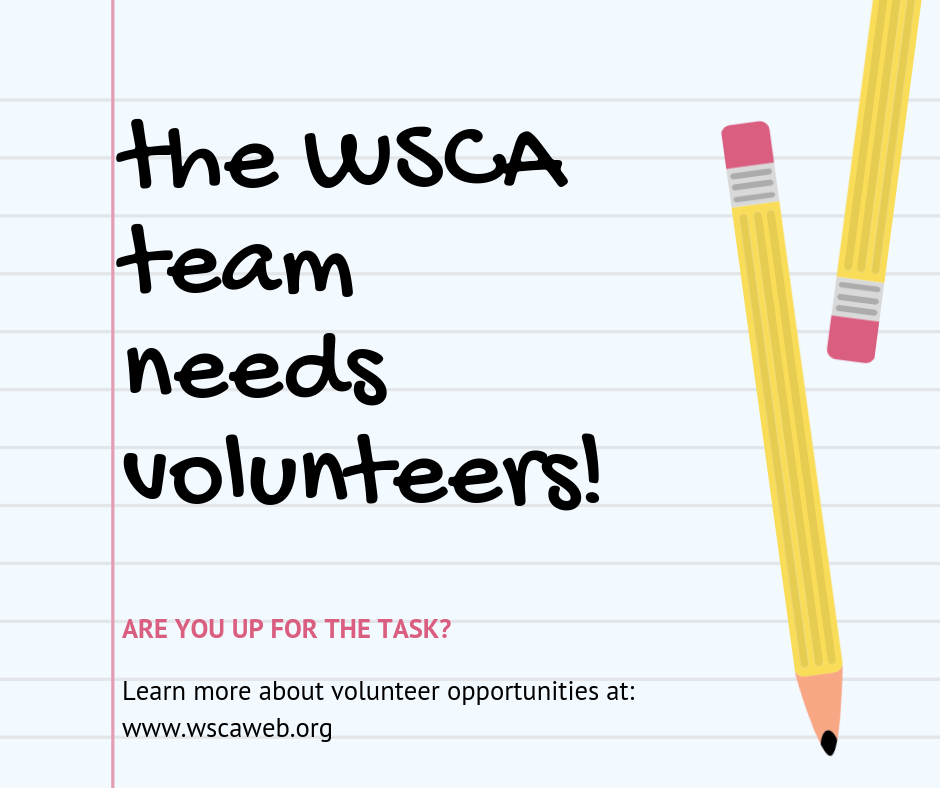May 2020

In This Issue:
- A Message from the Executive Director
- NEW – Counselor COVID 19 Website
- WSCA Virtual Brown Bag Lunch Collaboration
- A Message from the WSCA Board
- Feature Article – Reflecting on Self-Care & Social Justice
- Special Feature – Reminder! Self-Care: Through the Lens of the Wellness Wheel
- Legislative Update – Advocacy Update Briefing
- Counselink – Self Care & Summer Growth
- 2020-2021 Conference Update – Preconference Details Now Available!
- Sectional Presenters Needed!
- WSCA Professional Recognition Highlights – School Counselor of the Year & School Counseling Team Awards
- College & Career Readiness Update – COVID-19 ACP Resources for Juniors, Seniors, and their Families
- Special Interest Groups
- Summer Academy Save the Date – New Location Details
- WSCA Volunteers Needed
Moving Forward After Times of Crisis
Stacy Eslick, WSCA Executive Director
Last week we had a Brown Bag scheduled on the topic of “Moving Beyond Brown Bags and Zoom Meetings”. The Brown Bag was canceled but the message is still important, how do we transition? How do we move forward?
During the spring and summer is when many counselors begin planning for the next school year. Most of us hope that we will be able return to our schools in the fall with little to no changes. As with all things COVID19, we still don’t know what the public safety recommendations will be at the end of summer and what that means for schools.
What we know; students, families and education staff will need a great deal of social/emotional support. What we know; families, schools, communities, and states have been significantly impacted economically due to this crisis.
What does that mean for you? There is general consensus in the media that school counselors are very important as we navigate the next year. Counselors now need to start having conversations about the critical need for your services with your administrator(s). When administrators are thinking about the social, emotional and mental health needs of the students in your building do they immediately think of you? Are they aware of the services and supports you are currently providing your students? Have you talked with your administrator about your plans for next year and how that aligns with the plans they are crafting? If not, remember school counselor ethics state the responsibility counselors have to advocate for school counseling programs.
What is WSCA doing to help you during this transition?
-Brown Bags will shift from the primary purpose to collaborate and connect with other counselors to partnering with experts in the field to provide you resources to support students, families and staff. Upcoming topics include (more to come!):
-Supporting Students Grief & Loss using Solution Focused Counseling
-Supporting Families to Support Students
-Supporting student regulation and de-escalation: strategies that can be used at school & home and how to share with families
-Compassion Curve – Accelerating compassion during COVID-19: understanding our response to stress; compassion fatigue & secondary stress; compassionate leadership
-Advocacy Briefing: WSCA Directors, Rachel Pufall and Kelly O’Connell will share tips and resources to help you have these conversations with your administrators.
-WSCA Special Interest Groups (SIGS) will go live. SIGS were introduced at conference but put aside due to COVID19. Now that we are moving from crisis to stabilization, SIGS will provide WSCA members the opportunity to connect around these topics.
-Continued emphasis on leadership and equity. WSCA will be hosting books studies on leadership and equity that will help you in work in schools.
-WSCA is still planning our Summer Academy and Conference. We continue to monitor and follow state guidelines to ensure attendee safety.
Even before COVID19, WSCA has been promoting the idea of better together. None of us should feel like we are alone in the difficult but rewarding work of school counseling. WSCA is your association and here to support you. We look forward to partnering with you as we are all better together.
~Stacy
Miriam Brown, WSCA Assistant Board Chair
School Counselor at Sugar Creek Elementary, Verona, WI
On Saturday, April 25th, the Board of Directors met virtually to continue important conversations about the needs of school counselors across the state. The meeting paralleled the challenges and obstacles that professional school counselors are encountering everyday as we support public health initiatives by staying at home and supporting students remotely. Authentic and genuine relationships, the cornerstone of our profession and the reason most of us entered the field, are more difficult when mediated by technology. The ability to respond to crisis or acute emotional needs in person and in the moment has been taken away. Collaboration, coaching, and consulting, a satisfying role that school counselors take on daily, is now harder.
That same week, our school hosted a support session for staff where we shared ideas about how to achieve a healthful work-life balance while managing the stressors of a global pandemic. One colleague shared her daily intention to “live within her values.” This was where she identified the things most important in her life (for her it was faith, family, and friends), and she scheduled those into her day first, and everything else she managed to accomplish during the next 24 hours was a bonus, but not expected. That advice has stuck with me. My values, especially those that led me into the school counseling profession, have not changed because of the changes a global crisis have brought. However, the way I can engage and express those values has changed and that has created cognitive dissonance and some existential angst. I have to find new ways to live those values out.
In many ways, the work of your WSCA Board of Directors, the Directors of Operations, and of your Executive Director are a great example of how to “live within your values” during this tough time. Every meeting, we ground ourselves in the ends of our organization, the main imperative of which is: “Conditions exist so the Wisconsin School Counselors will practice with the highest level of effectiveness”. Our values established, we then discussed how to achieve those ends given the current restrictions, limitations, stressors, anxieties, and realities facing our members. Much like we all experience daily on a personal and professional level, plans the organization had made for the summer were changed. Priorities were reorganized. Needs were reassessed. The ends of our organization have not changed, but the ways we can support school counselors across the state has. And the needs of our members have changed significantly.
But, mostly importantly, at this meeting, board members showed each other the kindness and compassion that we all deserve to receive during this time. This meeting encapsulated important ways to approach being a professional (but also a human!) during this pandemic. We must ground ourselves in our values (ends). We must intentionally find ways to express those values in our new “normal.” And we must be forgiving of ourselves and others as we navigate how to be professionals and humans when there is so much insecurity. School counselors have an important role as we face both a viral epidemic and the accompanying mental health crisis. The profession’s shared goal of supporting students academically, emotionally, and in developing their careers has not been altered, but we have new demands placed upon us. Know that the amazing people who do the work of WSCA are here for you and this organization will be there to support the work of our state’s school counselors no matter what our new “normal” looks like.
~Miriam Brown
Reflecting on Self-Care & Social Justice
Erica Kruger, M.S. LPC
School Counselor
Madison School DistrictAs I am writing this, the sun is just starting to reach up over the trees outside my window. I have a freshly-made cup of coffee beside me, resting atop a pile of books. My journal is open on my lap, ready for attention, but for the past several minutes I have simply been staring out the window, watching a robin make its slow and deliberate investigation of the backyard. Given the rains that fell for most of yesterday, I imagine that the worm prospects are quite good at the moment. As I sit, I am appreciating that the house is quiet: The rest of the family is still asleep and although I sometimes wish I was as well, I have come to value this early morning alone time too much to give it up.
My intention with this reflection is to offer a few thoughts about self-care, in the hopes that they might prove supportive to you. I share them in gratitude for the many ways that you offer care and concern for the communities in which you work, especially in this time of uncertainty and challenge. I also share them with you from a place of practice and humility: I am no expert on self-care, by any means. I struggle to develop my own stable self-care practices and am still coming to understand how to engage in self-care in ways that align with my commitment to social justice. Lastly, I share them with recognition that each individual’s experience with self-care is significantly influenced by personal factors, including their values and beliefs and relevant cultural influences related to the idea of self-care. In addition, each individual’s experience with self-care is shaped – often inequitably – by external factors, including the ways in which aspects of their identity influence how they are treated by others and the degree to which resources to support self-care are accessible or inaccessible to them, given our country’s long history of developing public policies that privilege the wellbeing of certain identity-based groups at the expense of others.
I’ve attempted to organize my thoughts into four themes that I hope will offer some food for thought as you work to define/refine your relationship with self-care, (or whatever term feels more meaningful for you to describe attention to your own wellbeing). All of what follows has been inspired and influenced by the wisdom of many people, including Ruth King and Rhonda Magee, (both authors and mindfulness teachers), and writer and activist, Adrienne Maree Brown.
One: Self-care cannot exist without community care. The wellbeing of each and every one of us – and the health of our planet as a whole – is profoundly interconnected. We are often most aware of this at the small scale, within our families or our work teams, for example. When one of my children is struggling, it affects the rest of the household. And when I am able to respond with care, there is often a positive impact that extends to the rest of us, as well. The same principle is true at the larger scale of neighborhoods, cities, states, countries, and the world as a whole. Individual and collective wellbeing are inextricably linked together. For this reason it’s also important to be mindful that – to the extent that we are able – we don’t choose self-care practices that create harm for other people and our environment. I am far from perfect in this but more and more I am trying to pay attention: Do any services that I seek out to support wellbeing pay a real living wage? Are products that I’m purchasing affordable to me because the cost of keeping them that way has been displaced to others? And how am I choosing to share the resources to which I have access, in service of a vision of collective wellbeing?
Two: Self-care does not have a standard approach or set criteria. Despite all of the attention-grabbing links on the internet, (“5 Easy Strategies for Self-Care,” “The 10 Top Habits for Self-Care,” etc.), the act of caring for oneself is a very personal endeavor. There are often common themes: caring for the body, caring for the spirit, connecting with others, connecting with our inner world, finding joy, honoring difficult emotions, and so on. Defining what this looks like and how we go about it is a part of our self-care process. Taking the time to think about what is supportive to you, and acknowledging that it’s important to you – without evaluating, comparing, or judging it – is an act of self-compassion. For me, at this moment in time, early morning quiet, daily walks, coffee!, reading time, and forgiving myself when I lose patience with family members are all active self-care strategies. Yours might have overlap but will likely look different, as well. What does seem important is that we each know and can name some things that are supportive to us in practicing care for ourselves; and that we seek out ways – even small ways – to integrate some of those practices, as best as we can, into daily life.
Three: Self-care won’t look the same way all the time. Just as self-care requires personalization, so too do our practices to support it. As our lives shift and change, how we define and support self-care will also likely change. We can benefit from offering ourselves some grace with this process and the permission to ask ourselves, in any given moment, what would be supportive right now? A therapist with whom I have worked once offered me the gift of this simple mindfulness practice: Pause; Notice what is happening inside the body, (thoughts, emotions, physical sensations); Breathe and acknowledge that this is all present right now; Ask yourself, given all that is happening, what might be a wise and kind way to respond to it? I use this practice often in challenging moments but I also find that a broader, parallel question, (given all that is happening in life right now, what might be some wise and kind ways to practice being well?), can be a supportive way to identify how I might nurture wellbeing at that stage of my life. Context and conditions matter a great deal: The resources that we have access to, (time, space, money, flexibility, etc), and the life responsibilities that we have, (family, work, roles, duties, etc.), are often changing. In my first year as a school counselor, self-care was walking in the door to my house each Friday and instantly falling asleep on the couch for two hours. Later, as a brand-new mother, self-care was making sure to set foot in a shower at least once a week. Our practices will need to change and grow, just as we are changing and growing, but it may support us to try and build the habit of checking-in: Given all that is happening within me and around me right now, what might be some wise and kind ways to respond? Sometimes all that we will be able to manage will be something small and simple – offering ourselves self-compassion instead of judgement, taking a deep breath instead of losing our temper, walking away and taking a break from someone who is challenging us rather than trying to “stick it out”, walking around the block, (when our goal was to walk a mile), or intentionally not doing something on our to-do list.
Four: Self-care sometimes takes a lot of work. It has taken me a long time to come to terms with this paradox. Self-care sounds like it should be about feeling good. Feeling good seems like it should be about ease, relaxation, and not too much effort. And yet, in a social culture that prioritizes productivity, in a profession focused on service, and as part of local and global communities that have been – and are now even more so – experiencing significant levels of need, it can be incredibly challenging to create and protect the space for attention to wellbeing. It takes intention, commitment, and effort. And sometimes it also takes pushing back against workplace culture and/or the judgement of others who may perceive “self-care” as too soft, indulgent, or self-focused. But, the world around us is filled with evidence of what happens when we consistently ignore care-taking; of our natural world, our interconnectedness to each other, and our own physical and mental wellbeing. In the midst of all this, I am coming to see attention to self-care as a radical act; fundamental to my becoming more aware of – and engaging in disruption of – past habits of harm that I practiced on myself, on others, and on our environment. A core teacher for me in this has been the author and activist Adrienne Maree Brown. In her book Emergent Strategy, she writes about fractals – a concept from our natural world that speaks to patterns that show up at both the small and large scale. In her words, “what we practice at the small scale sets the patterns for the whole system.” (p.53). This understanding supports her in seeing how the ways that she practices care for self, become the energy that ripples out into her work of caring for others. In this way, the act of offering compassion to self, and experiencing the care it provides can inspire us to want to share this experience with others while also helping to ensure that we are not trying to “pour into others’ cups from an empty pitcher.”
As I bring this to a close it feels important to end by acknowledging the many ways in which this reflection on self-care has been influenced by my own identity and life experiences: I am a white, cisgender, female for whom English was my first language. Though my father grew up with very limited financial resources and was the first in his family to attend college, he ultimately secured a job that supported us in having consistent, stable access to food and housing and resources from my mother’s family supported postsecondary educational opportunities. I have been, and continue to be, the beneficiary of a significant amount of unearned privilege and coming to understand the injustice of that has been an important part of propelling me to think more critically about both my personal self-care practices and the responsibility I hold to advocate for the conditions that support the wellbeing of all.
I believe that self-care and wellbeing are a right, not a privilege. A key reason that I was drawn to, and continue to be inspired by our profession is that school counselors focus on advocating for, and creating educational spaces that nurture wholeness for all students, all families, all school communities: We honor the truth that all of us deserve to feel cared for, have access to opportunities for self-care, and live in environments that support our wellbeing. As you find your way forward in the time ahead, my hope is that you are able to do so – personally and professionally – with kindness, fierce compassion, and a continued commitment to making our world more caring and just for all who inhabit it.
Reminder! Self-Care: Through the Lens of the Wellness Wheel
Ajitha Chandrika Prasanna Kumaran, PhD
Senior Lecturer at UW-Stout
President of the Texas Association for Humanistic Education and DevelopmentThe counseling process is focused on a wellness model approach. The wellness model of counseling aims to incorporate all the parts of a whole person’s strengths and weaknesses. Generally, an individual’s wellness may be based on ideal or real state of wellness. The indivisible-self created by Sweeney and Myers in early 2000’s based on Adlerian theories includes five constructs of individual wellbeing: physical, social, essential, creative, and coping. This is an evidence-based model used by several mental health and counseling practitioners wherein they help the clients to understand the wellness wheel and importance of the interaction between the constructs to promote positive life changes. These life changes will enhance their quality of life and eventually reduce their presenting complaints.
In today’s world, researchers have modified the constructs to the wellness model and added financial, spiritual, occupational, and other areas of individual’s life. Everyone is constantly thriving to survive and to lead a best possible life balancing physical, emotional, spiritual, social, occupational, financial, and environmental. There must be equilibrium, among all the dimensions of the wellness wheel. What happens when one or two of the dimensions are disturbed? For instance, if there is an imbalance between work and financial dimension the individual will be dissatisfied with work, stressed, and confused which will affect other parts of his/her life.
It is difficult to find balance among the constructs of the wellness wheel and lead a happy life forever as there are so many events in life which we have no control over. During such phases of life, we all must remember to be compassionate to ourselves and take time towards self-care. Self-care promotes and strengthens our mental immunity which will result in conserving our energy to maintain balance among the wellness dimensions under adverse situations. For instance, currently we all are in a situation which is difficult and affecting some parts of our life. There is an increase in anxiety, depression, stress, and other mental health symptoms among individuals around us. Research suggests the power of self-compassion helps people to recognize and be aware of the importance of being kind to themselves in the time of unpleasant situations.
There is a significant correlation between self-care/compassion and the components of the wellness wheel. In conclusion, of this article I would like to add few self-care interventions I have read and practiced:
-Creating daily and weekly routine to regulate the difference between work and other activities
-Grounding techniques will help you focus on the present
-Cultivating and practicing mindfulness
-Nature Walks
-Activating your creative self (e.g. old or new hobbies) to thrive to balance other parts of the wellness wheel



